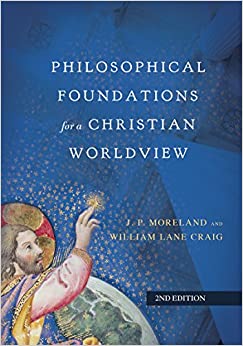|
Listen to this post:
|
This post and the next are by our friend Tre Brickley, who is currently serving in the US Army and is stationed in California with his wife Kaitlin. He is pursuing two associate degrees and intends to continue his education in the field of analytic theology.
Earlier this year, I submitted a question to Reasonable Faith, the ministry of Dr. William Lane Craig, with which I’m sure many who follow this blog are already familiar. My question pertained to Dr. Craig’s articulation of the doctrine of the Trinity which he calls “Trinity Monotheism.” Here is the question as it was submitted:
Dr. Craig, Thank you for your work. After reviewing your “Trinity Monotheism,” it seems to me that your view is that the Trinity (the collection of the three Persons: Father, Son, and Holy Spirit) is the “only true god.” Therefore, it is not true of any person of the Trinity (Father, Son, or Holy Spirit) that he is a god. But this conclusion seems incompatible with the New Testament data. Jesus referred to his Father as “the only true god” (John 17:3). Furthermore, he later said that his god is our god too (John 20:17). First, it seems to me that, for these statements to be true (that the Father is the only true god and that Jesus’s god is our god), it must be true of the person referenced (the Father) that he is a god. Second, it seems to literally follow from your view that the Trinity (the only true god in your view) is some other god than Jesus’s god or our god. How would you respond to this?
Before interacting with Dr. Craig’s response to my question, I would like to better articulate the points I am raising. As I said at the beginning of my question, it seems to me that Dr. Craig articulates a doctrine of the Trinity whereby these two conditions are met: that there is only one god and that the three persons (Father, Son, and Holy Spirit) taken together are this one god. The crucial thing to notice about Dr. Craig’s articulation is the phrase I’ve used “taken together” in my second condition. Notice how I phrased my definition of Dr. Craig’s view in my question: “…it seems to me that your view is that the Trinity (the collection of the three persons: Father, Son, and Holy Spirit) is the ‘only true god.’” In Dr. Craig’s view, it is the collection of the three persons, the Trinity, that is the only true god.
Insofar as this is a correct understanding of Dr. Craig’s view, then it would logically follow, as I said in my question, that “it is not true of any person of the Trinity (Father, Son, or Holy Spirit) that he is a god.” Consider the following argument.
- There is only one god. (Typical expression of monotheism, which is Dr. Craig’s view.)
- The Trinity is this one god. (Entailed by Dr. Craig’s “Trinity monotheism.”)
- Therefore, nothing other than the Trinity is a god. (1,2)
- The Father is a thing other than the Trinity (i.e. these are not numerically identical).
- Therefore, the Father is not a god. (3,4)
The same reasoning applies to the Son and the Holy Spirit, but I’ve used the Father in my argument because this provides an easy transition to the next points in my question.
Next in my question, I make two points: one to argue that we shouldn’t accept the implication of Dr. Craig’s view that the Father is not a god, and one to argue that we shouldn’t accept Dr. Craig’s view that “the Trinity (the collection of the three persons: Father, Son, and Holy Spirit) is the only true god.” My first point was this: if it is true that the Father is the only true god and that Jesus’s god (the Father) is the god of his followers as well, then it must be true that the Father is a god, contra the implication of Dr. Craig’s view that the Father is not a god. My second point was this: in Dr. Craig’s view (again, that the collection of the persons Father, Son, and Holy Spirit is the only true god), the only true god would be something other than the one who Jesus identified as the only true god, as his own god, and as the god of his followers (John 17:3; John 20:17).

With these clarifications in mind, let’s look at how Dr. Craig has graciously responded to my question on his podcast. Dr. Craig begins his response by saying, “…his inference is correct that it must be true of the person referenced, the Father, that he is a god.” From this it seems he denies the conclusion I drew in my question (“Therefore, it is not true of any person of the Trinity…that he is a god”) and the conclusion I made in the argument above (“Therefore, the Father is not a god”).
He goes on to say “…that is not an inference that John draws…because John clearly regards Jesus as god, as fully divine as God the Father”. He is not referring here to the inference that “the Father is a god” but rather to the inference, as he says later, “that God the Father alone is a god.” He then goes on to provide some Scriptural support for the notion that John regards Jesus as a god. After pointing out this support, he says, “So, John himself does not draw the inference that Tre does: that God the Father alone is a god. Rather he would say that the Father is god, that Jesus is god, and I think John would say that the Holy Spirit is god as well. So…god is three in one. There is only one god, but all three of these persons are divine.”
From this response, it seems that Dr. Craig’s view entails the following affirmations:
- The Father is a god.
- The Son is a god.
- The Holy Spirit is a god.
- The Trinity (the collection of the three persons Father, Son, and Holy Spirit) is a god.
- The Father is not the Son.
- The Son is not the Holy Spirit.
- The Holy Spirit is not the Father.
- The Father is not the Trinity
- The Son is not the Trinity.
- The Holy Spirit is not the Trinity.
- There are at least four gods (1-10).
- There is only one god.
However, surely Dr. Craig intends to affirm only 12 and not also 11. But, from what he chose to say in response to me, it is hard to see how he can escape 11. We need to look elsewhere in his work to better understand his view.

When we examine Dr. Craig’s view more closely, we find in his published work that when he says “is a god” of any of the three persons he doesn’t mean this as a statement of identity (e.g. that said person just is God) but rather as a statement of predication; whereas, when he says “is a god” of the Trinity he does mean this as a statement of identity. He says in his book Philosophical Foundations for a Christian Worldview,
So while the statement ‘The Trinity is God’ is an identity statement, statements about the persons like ‘The Father is God’ are not identity statements. Rather, they perform other functions, such as ascribing a title or office to a person…or ascribing a property to a person…
Next time: What Dr. Craig means by “is God” and “is a god,” and some conclusions.
